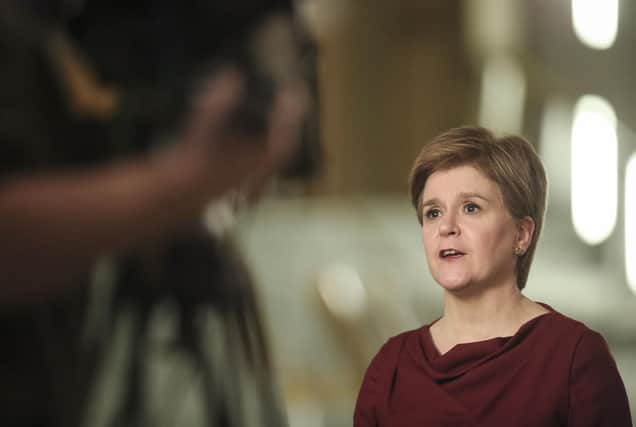In the most challenging of years, how will Nicola Sturgeon reflect on how she has done? – Joyce McMillan


If Nicola Sturgeon has time to pause and take stock, though, she may well feel that under the circumstances, she has managed to “do” quite a bit; not least, under pandemic conditions, in winning a mandate to lead Scotland for another five years, in May’s Scottish Parliament elections. In a sense, this has rapidly become the election that time forgot; it produced an overall result not much different from that of 2016, with the SNP gaining a single seat, and the Greens adding enough support to win a semi-formal place in Scottish Government.
Yet it did so on a notably increased turnout (perhaps due to widespread postal voting), at a time when the SNP have already been in power for 14 years; and in the aftermath of a bitter and prolonged public confrontation between Nicola Sturgeon and her predecessor, Alex Salmond, that many in the Scottish media and political village believed might be terminally damaging to the First Minister’s position.
Advertisement
Hide AdAdvertisement
Hide AdIn fact, though, the whole affair seems barely to have dented Nicola Sturgeon’s reputation with voters, who dismissed Alex Salmond’s new Alba Party with a humiliating 1.7% of the vote, and essentially invited the First Minister and her government to keep calm and carry on. This is not, of course, a very exciting story, and it’s perhaps not surprising that some commentators largely chose to ignore it, talking of support for independence in decline since 2014 (a notion contradicted by the polls), and of a First Minister on the verge of leaving politics for the kind of international job that would clearly match her interests, abilities, and growing network of international partners - all assets clearly on view during Cop 26 in Glasgow.
Yet despite all these achievements - and an approach to pandemic management that still seems to command widespread public support, despite the loud special pleading of some groups - Nicola Sturgeon remains a leader caught between a rock and two very hard places, in terms of the constitutional debate. On one hand, there is her own deep and accurate understanding of the fundamental caution of Scottish voters, particularly in a time of such uncertainty and crisis. She tried once to exploit a crisis in order to advance the cause of independence, in the immediate aftermath of the Brexit referendum, and saw her party suffer severe electoral losses; she will not make the same mistake again.
On the other hand, though, there is the constant online carping and roaring of those in the independence movement who believe that given “real leadership” - by which they often seem to mean more macho posturing - Scotland could somehow be seizing its independence at this very moment. And dead ahead, there is the implacable opposition of a fiercely nationalistic UK government which may, as its every action has shown, care little for Northern Ireland, but has no intention of letting go of Scotland, which represents one-third of its territory, more than half of its sea area, and a huge proportion of its energy resources of all kinds. It is an ugly attitude, in a Union which is supposed to exist by consent; but Nicola Sturgeon is probably right to conclude that the vast majority of Scots, of all persuasions, would be appalled by any prospect of serious disruptive confrontation with the UK government at this time, and she has not managed to devise an exit strategy from the constitutional Catch 22 in which Scotland therefore finds itself.
For what it’s worth, it seems to me that what is absent from the debate, at the moment, is a short but vivid account of the positive future that independence supporters are trying to achieve - a Scotland’s Future for the 2020s and 30’s, if you like, that would both attract new supporters, and provide a serious basis for discussion; and it is the absence of any such forward-looking document from the Scottish National Party - fit for discussion during these long months of pandemic, and ready for updating before any future referendum - that seems to me the key strategic failure of Nicola Sturgeon’s SNP leadership so far.
As the story of the current Westminster government shows, though, perfection in leadership is something rarely if ever found, and perhaps not worth seeking. The truth about Nicola Sturgeon is that she is, in many respects, Scotland’s Angela Merkel; personally unpretentious, close to the centre of gravity of her nation’s views on most issues, strongly committed to basic legality and human rights, not a strategic genius but a decent practical decision-maker, and - perhaps above all - electorally successful to an extent that her opponents find difficult to fathom.
These are not radical qualities; and they may, in the end, not be enough to achieve anything as profound as full Scottish independence. Given a cautious electorate, though, they can be enough to keep a leader in power for much longer than the seven years the First Minister has enjoyed so far. Angela Merkel, after all, lasted for sixteen years, through notably turbulent times; and Nicola Sturgeon’s opponents, both within and outside the independence movement, may have to live with the possibility that Scotland’s leader, armed with so many of the same qualities, will demonstrate a similar staying-power, in the decade to come.
